Everyfamilyhas its own set of rules and expectations, especially regarding elders in the house. In some Asian households, you’re expected to wait for the eldest to begin eating before you do. In others, there may be unspokenguidelinesabout how to behave at the dinner table. While it’s understandable to follow these customs out of respect, sometimes it’s necessary to prioritize your own needs.A woman recentlysharedher decision to eat before her mother-in-law finished her prayer, igniting outrage and judgment from her family. Although her hunger prompted this bold choice, it sparked a heated debate about respect and family dynamics. Keep reading to discover how this seemingly simple decision escalated into a full-blown family drama.RELATED:In some cultures, praying daily is an integral part of their traditions and way of lifeImage credits:Nina Zeynep Güler (not the actual photo)A woman recounted how her mother-in-law labeled her as manner less for deciding to start eating before she finished her prayerImage credits:Anna Jakutajc-Wojtalik (not the actual photo)Image credits:throwawayaita70The author provided additional insights into the meal dynamics and how things are handled in their householdImage credits:Nina Zeynep Güler / Unsplash (not the actual photo)Prayers play an essential role in daily life, promoting discipline and a sense of belonging within the Islamic communityTo gain a deeper understanding of theprayer systemin Islam, we spoke with an Imam from India. He explained, “A Muslim is obligated to perform five daily prayers, known as Salah, at specific times throughout the day.”He further mentioned, “While these prayers are important, they are not directly tied to meal times. Instead, they serve as essential moments of spiritual reflection and connection to God, helping to structure the day around faith.” The Imam emphasized that, regardless of mealtimes, these prayers are a vital part of their daily routine, fostering discipline and a sense of community.In this particular situation, the family chose to wait for the author’s mother-in-law to finish her prayer before they began their meal, honoring the tradition of respect for elders. However, this practice varies greatly around the world, with uniquedining etiquettesshaping how families share their meals.Image credits:Nguyễn Khanh / Pexels (not the actual photo)Dinner etiquette varies widely across cultures, with each country having its own unique customs and traditionsFor example, in Japan, it’scustomaryto place your hands together in a prayer-like gesture, bow your head slightly, and say “itadakimasu” before eating. This phrase, which translates to “I humbly receive,” is not just a formality; it embodies a deep sense of gratitude and respect for the food, the effort that went into preparing it, and the natural world that provides it.In France, dining is more than just a meal; it’s an experience that emphasizes connection and appreciation. French food expert Laura Calderexplains, “When you’re dining with people, you’re expected to engage in conversation, appreciate your food and the ambiance, and be present where you are.” She adds, “So keep that mobile phone tucked away.”While chopsticks are a staple in Chinese dining, there are importantetiquetterules to follow. You shouldn’t use chopsticks that have touched your mouth to take any food from a shared plate. It is considered unhygienic. Instead, you should use the utensils specifically provided for this purpose. If these aren’t available, it’s best to look for a clean pair of chopsticks to transfer food from the shared plate to your own.In many Indian households, it is customary to eat using only your right hand. Using the left hand is typically frowned upon and considered unclean. This practice reflects cultural beliefs about hygiene and respect during meals. Additionally, sharing food from your plate is a cherished tradition, symbolizingfriendshipand hospitality.While some of these etiquettes are deeply rooted in cultural traditions, there are certain unwritten meal rules that sometimes don’t seem fair or reasonable. In this case, do you think the daughter-in-law acted appropriately? Was the author’s mother-in-law’s behavior justified?People online felt that the author’s mother-in-law was acting unfairly and displaying rude behavior[YTA] A few others believed that the author was partly to blame in this situationThanks! Check out the results:
Everyfamilyhas its own set of rules and expectations, especially regarding elders in the house. In some Asian households, you’re expected to wait for the eldest to begin eating before you do. In others, there may be unspokenguidelinesabout how to behave at the dinner table. While it’s understandable to follow these customs out of respect, sometimes it’s necessary to prioritize your own needs.
A woman recentlysharedher decision to eat before her mother-in-law finished her prayer, igniting outrage and judgment from her family. Although her hunger prompted this bold choice, it sparked a heated debate about respect and family dynamics. Keep reading to discover how this seemingly simple decision escalated into a full-blown family drama.
RELATED:
In some cultures, praying daily is an integral part of their traditions and way of life

Image credits:Nina Zeynep Güler (not the actual photo)
A woman recounted how her mother-in-law labeled her as manner less for deciding to start eating before she finished her prayer
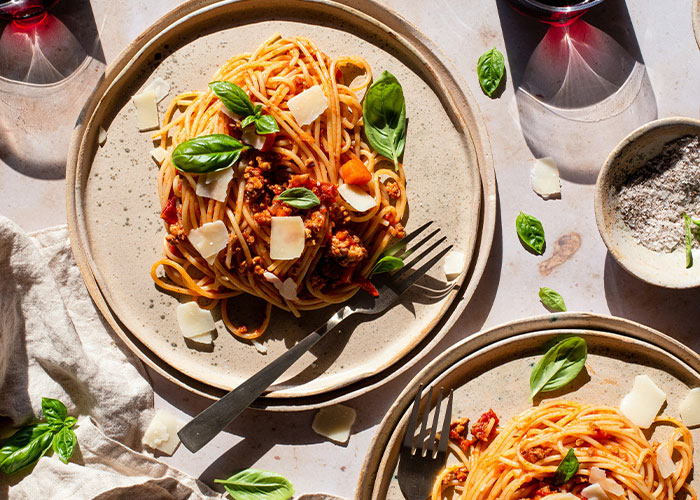
Image credits:Anna Jakutajc-Wojtalik (not the actual photo)

Image credits:throwawayaita70
The author provided additional insights into the meal dynamics and how things are handled in their household
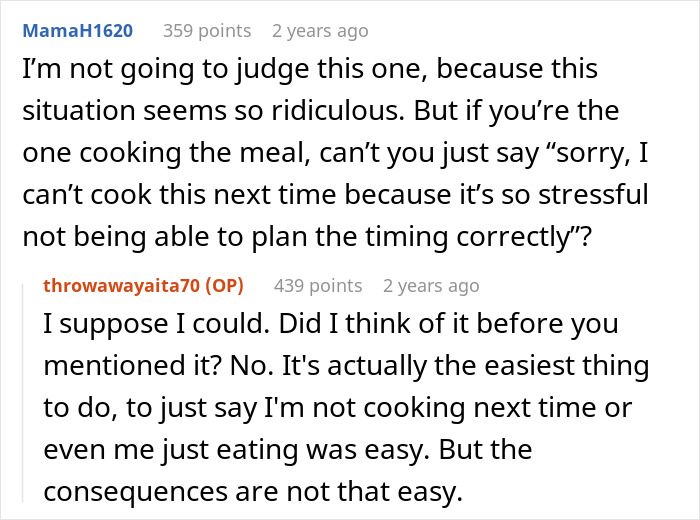
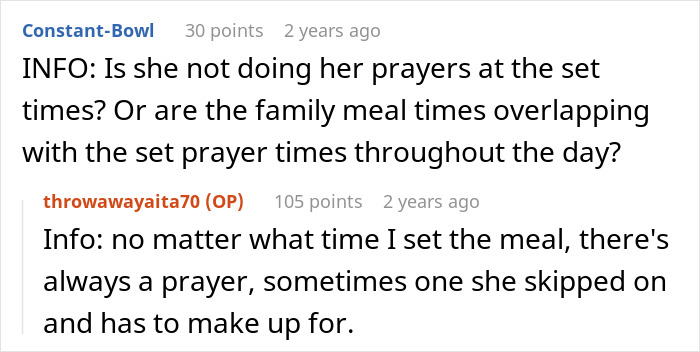


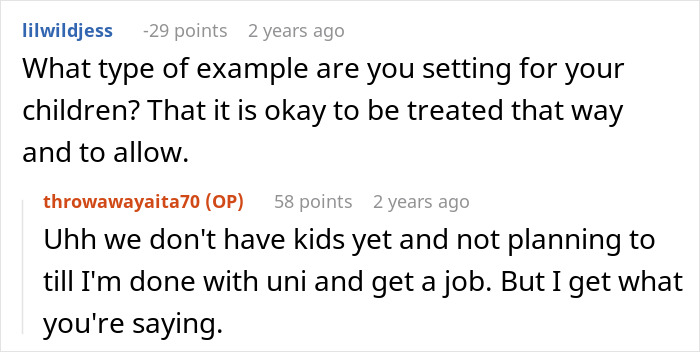
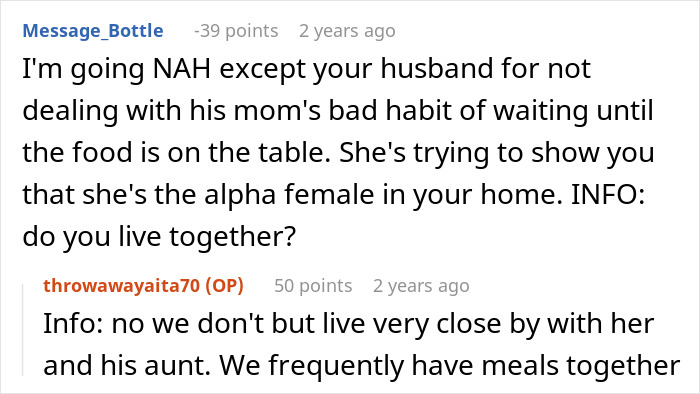
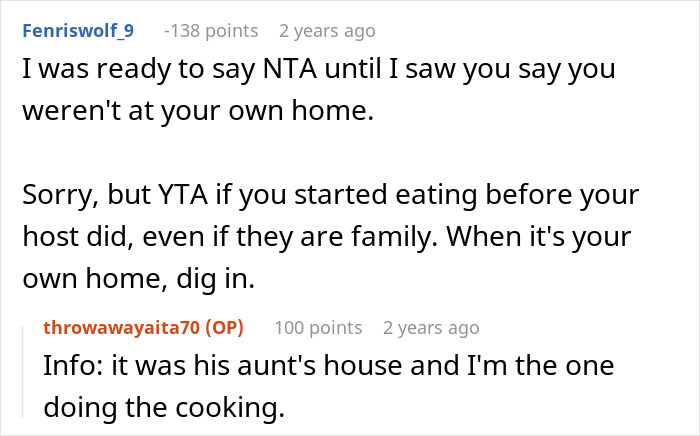
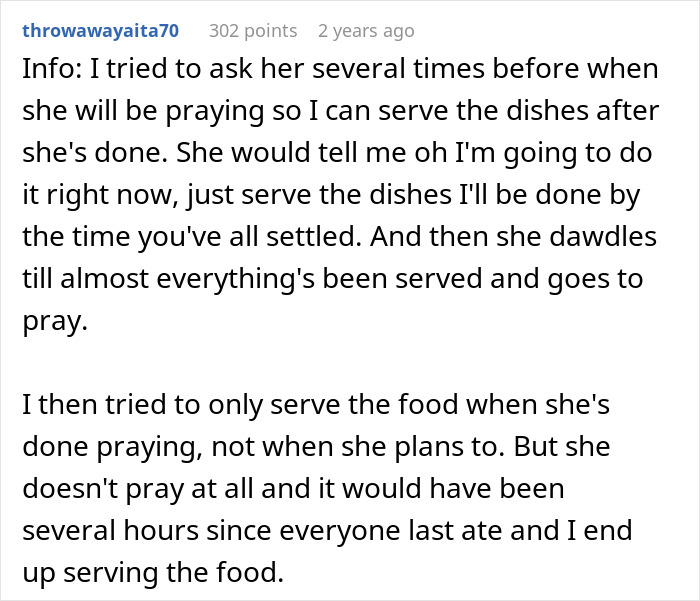
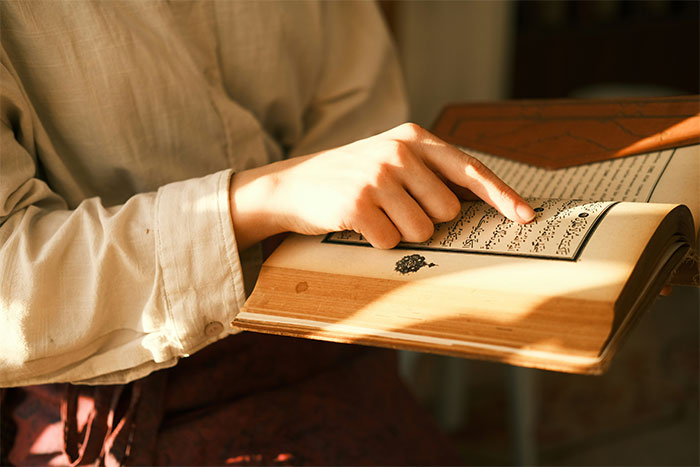
Image credits:Nina Zeynep Güler / Unsplash (not the actual photo)
Prayers play an essential role in daily life, promoting discipline and a sense of belonging within the Islamic community
To gain a deeper understanding of theprayer systemin Islam, we spoke with an Imam from India. He explained, “A Muslim is obligated to perform five daily prayers, known as Salah, at specific times throughout the day.”
He further mentioned, “While these prayers are important, they are not directly tied to meal times. Instead, they serve as essential moments of spiritual reflection and connection to God, helping to structure the day around faith.” The Imam emphasized that, regardless of mealtimes, these prayers are a vital part of their daily routine, fostering discipline and a sense of community.
In this particular situation, the family chose to wait for the author’s mother-in-law to finish her prayer before they began their meal, honoring the tradition of respect for elders. However, this practice varies greatly around the world, with uniquedining etiquettesshaping how families share their meals.

Image credits:Nguyễn Khanh / Pexels (not the actual photo)
Dinner etiquette varies widely across cultures, with each country having its own unique customs and traditions
For example, in Japan, it’scustomaryto place your hands together in a prayer-like gesture, bow your head slightly, and say “itadakimasu” before eating. This phrase, which translates to “I humbly receive,” is not just a formality; it embodies a deep sense of gratitude and respect for the food, the effort that went into preparing it, and the natural world that provides it.
In France, dining is more than just a meal; it’s an experience that emphasizes connection and appreciation. French food expert Laura Calderexplains, “When you’re dining with people, you’re expected to engage in conversation, appreciate your food and the ambiance, and be present where you are.” She adds, “So keep that mobile phone tucked away.”
While chopsticks are a staple in Chinese dining, there are importantetiquetterules to follow. You shouldn’t use chopsticks that have touched your mouth to take any food from a shared plate. It is considered unhygienic. Instead, you should use the utensils specifically provided for this purpose. If these aren’t available, it’s best to look for a clean pair of chopsticks to transfer food from the shared plate to your own.
In many Indian households, it is customary to eat using only your right hand. Using the left hand is typically frowned upon and considered unclean. This practice reflects cultural beliefs about hygiene and respect during meals. Additionally, sharing food from your plate is a cherished tradition, symbolizingfriendshipand hospitality.
While some of these etiquettes are deeply rooted in cultural traditions, there are certain unwritten meal rules that sometimes don’t seem fair or reasonable. In this case, do you think the daughter-in-law acted appropriately? Was the author’s mother-in-law’s behavior justified?
People online felt that the author’s mother-in-law was acting unfairly and displaying rude behavior
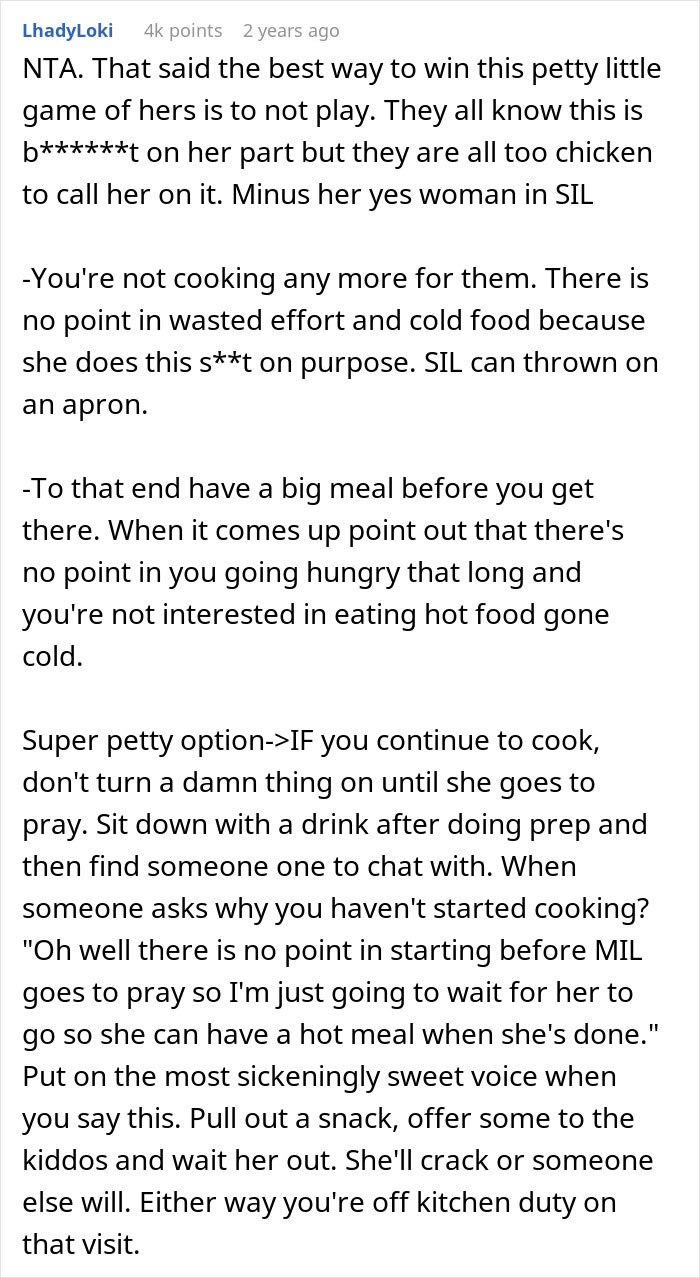
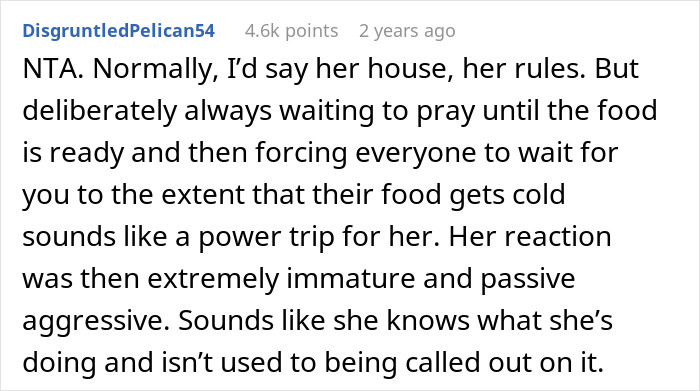
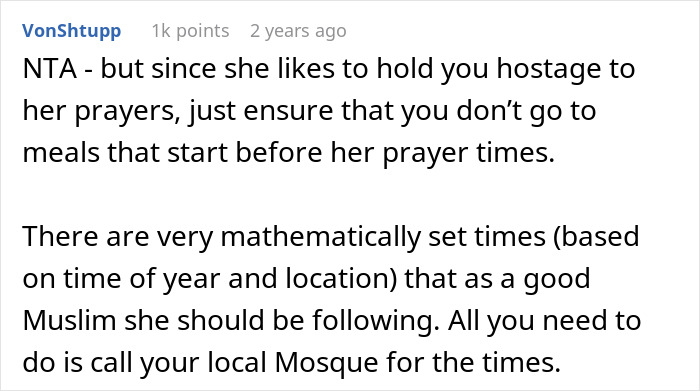


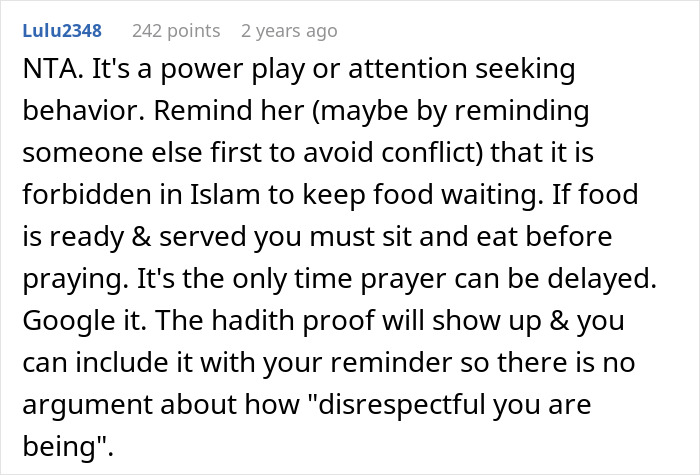

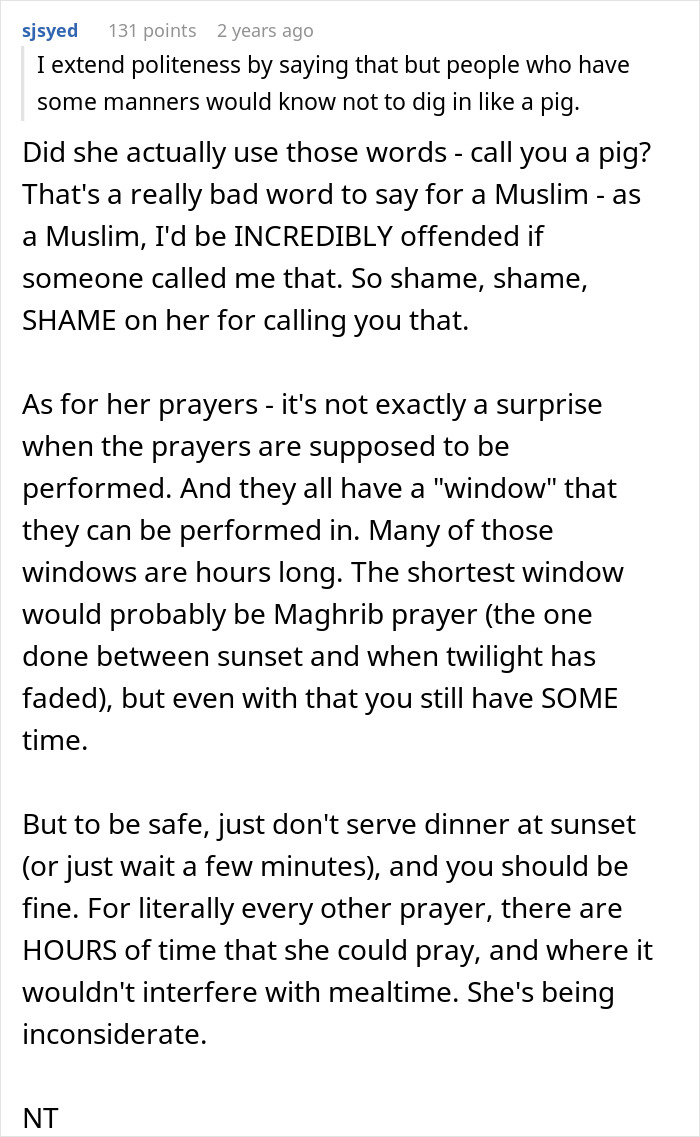


[YTA] A few others believed that the author was partly to blame in this situation

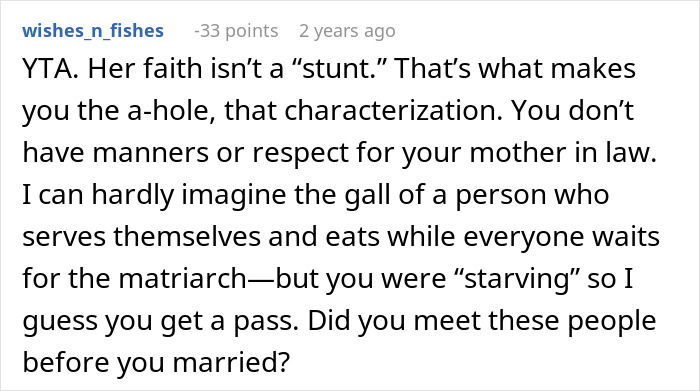
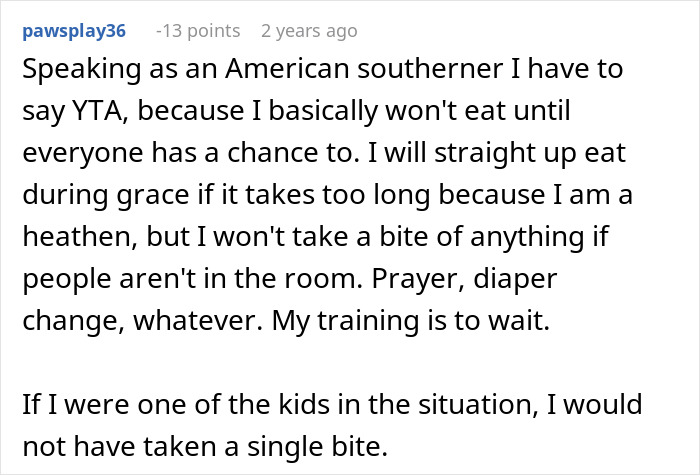



Thanks! Check out the results:Gabija Saveiskyte
Monika Pašukonytė
Denis Krotovas
Relationships